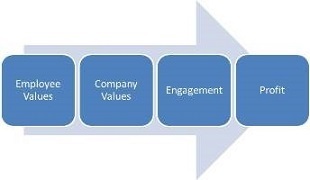
While many of the most effective corporate cultures have a grassroots element that incorporates the thoughts and ideas of the individuals on the front lines (which is a crucial element in building a strong culture), allowing a culture to be nurtured and developed always starts at the top: i.e. with the CEO and senior leadership.
At the top level of an organization, it is important to have a strong belief system and vision of what the organization stands for and what it values. Whether a public company or a private company, the culture of the organization is always heavily influenced by the beliefs, attitudes and actions of the leaders of the company. This makes common sense given that an organization is nothing more than a collection of individuals. The individuals that are in senior positions of responsibility will usually utilize their personal experiences, beliefs and learnings to drive the values of the organization (both good and bad). Along the way, they may even change the face of the organization over time as their values change and they decide to re-direct the focus of the organization.
In the past few years, we have seen many organizations fail even though the organization had great sounding Mission, Vision and Values statements. Of course one of the most visible in recent history was Enron whose values included the words, Integrity, Respect, Communication and Excellence. The failing of course is that the leaders at the top did not actually subscribe to those values.
Having a clear idea of values is the foundation towards building culture. If the organization values short-term bottom line profits above all else, then it would be just empty words to have a values statement that touts corporate social responsibility and sustainability. If the organization is about profit... know it, recognize it, hire for it, and be it. If the organization is about customer service... know it, recognize it, hire for it, be it.
This post is not a debate about correct or best organizational values. My point is:
- No matter what the sign on the wall says, the true values of the organization are a reflection of the influencers; and
- The process of defining and developing any corporate culture starts with an honest look at values.
If the organization values people, then the values statement will emphasize this aspect. If the organization values autonomy, then the values statement will emphasize this aspect. If the organization values structure... you can see where this goes. Once a clear and honest values-review is completed, the organization will be in a much better position to hire people that are in alignment with the values which provide the foundation for decision-making that is consistent with the values. Ultimately, the true corporate culture will spring forth from the people and decisions that are being made, based on the agreed upon values.
Keith Richards is a Partner with the Newport Board Group, a national professional services firm of strategic advisors, seated Board Directors and Interim C-Level executives. He's also a Director with Integral Edge Partners focusing on high performance leadership transformation and corporate culture development. He is a regular commentator on a variety of business radio programs, keynote speaker and blog author. Keith can be reached at keith.richards@newportboardgroup.com followed LinkedIn at www.linkedin.com/in/keitharichards and on twitter @KRLeadership.
